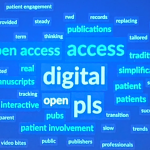In the last weekly digest of 2021, we get an update from Open GLAM, which advocates open access to cultural heritage. We hear about the potential role of open data in rare diseases and in combatting publication bias. We also hear from Nobel Prize laureate Dr William G Kaelin Jr regarding his opinion on the future of science and the role of open access. Finally, Science Open highlight some not-for-profits working to foster open access throughout Africa.
To read:
Open access to galleries, libraries, archives and museums via Medium | 6-minute read
For over a decade, the Open GLAM (Galleries, Libraries, Archives and Museums) movement has advocated open access to cultural heritage held in memory institutions to promote the exchange of ideas and enable equity of knowledge. This recent report highlights the global distribution of Open GLAM and classifies the primary functions of institutions that follow open access to cultural heritage principles.
A new open access policy at EMBL via EMBL | 20-minute read
The European Molecular Biology Laboratory (EMBL), an intergovernmental organization and laboratory for the life sciences, have released a new Open Science Policy as part of their ongoing commitment to drive trust, transparency and more inclusive research across the life sciences. The policy states that all EMBL publications should be made openly available in Europe PMC. There is also a requirement to publish preprints of all manuscripts in a preprint server indexed by Europe PMC. Finally, data should be submitted as complete data sets and comply with FAIR principles.
Open data to combat publication bias via Proceedings of the National Academy of Sciences of the Untied States of America | 20-minute read
Publication bias continues to skew literature towards statistically significant results, many of which may be false positives. To mitigate this bias, the authors of this paper propose a framework to enable authors to “report all results efficiently” – known as the RARE framework. Their proposed framework depicts an integrated system that leverages the capacities of an existing data infrastructure that is predominantly open, in the form of public registries, institutional review boards and journals. Through this, they hope to efficiently incentivize full reporting and thereby improve confidence in science findings.
The power of open data in rare diseases via STAT News | 8-minute read
This interview tells the story of Corrie Painter, a biochemist who was diagnosed with primary breast angiosarcoma. After her diagnosis, when Carrie searched the scientific literature for answers, she found a vacuum of data and research into rare cancers. This inspired her to expedite the pace of discovery for angiosarcoma and other rare cancers, and through an initiative called Count Me In, she hopes to make patient data (such as tumour samples, medical records and more) readily available for researchers interested in decoding rare diseases. Carrie is a vocal advocate for open data, and in this interview, she discusses some of its key benefits and challenges.
To watch:
Nobel Prize laureate on open access and the future of science via YouTube | 30-minute watch
This YouTube series consists of interviews with inspirational individuals who have won the Nobel Prize. In this episode, the host interviews Dr William G Kaelin Jr, who was awarded the 2019 Nobel Prize in Physiology or Medicine on his work on Von Hippel-Lindau disease and for the discoveries of how cells sense and adapt to oxygen availability. The pair discuss Dr Kaelin’s work, the main challenges facing science now and in the near future, and his opinions on open access science.
To engage with:
Support open access initiatives via Science Open
In the giving spirit of the holiday season, Science Open highlight some inspiring not-for-profits that are working to develop their continent’s research infrastructure and foster open access. They include the Sudanese Researchers Foundation, which aims to create a common platform for interaction between Sudanese learners and researchers, AfricaArXiv, the pan-African open access research portal and the Journal of Ecological Society, which advocates an ecological approach to sustainable development and nature conservation.
Open access and COVID-19 via Open Access Scholarly Publishers Association
On 6 December 2021, the Research on Research Institute (RoRI) released a report analysing preprints, data sharing, peer review practices, and the social and scientific attention that COVID-19 papers have received. In this webinar on 13 January 2022, which will be hosted by Open Access Scholarly Publishing Association (OASPA), the members of RoRI summarize the approach and evidence that have informed the key recommendations of this report. The webinar will also include other stakeholders, including publishers and early career researchers, to hear their perspectives on the report. You can register for the webinar here.
Learn about open research principles via Framework for Open and Reproducible Research Training
Christopher Eaker, Data Curation Librarian at University of Tennessee Libraries, has developed the Open Research Toolkit, a series of training modules on various topics within open research. The 14 modules cover a broad range of topics, including the open research ecosystem and the principles and practices of open research, citizen science, open peer review, open licencing and open data, and software. All resources can be found here, and accompanying videos are publicly accessible on YouTube.
Wishing all of our readers a wonderful holiday season, and we look forward to seeing where Open Pharma takes us in 2022!
Merry Christmas and Happy New Year from the Open Pharma team!






